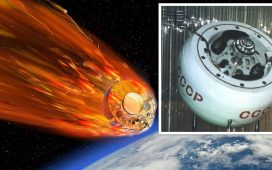Intelligent life elsewhere in the universe may not be as unlikely as we once thought, scientists have discovered.
A new study by Penn State University has developed a new model for how intelligent life developed on Earth. It has found that unlike previous thought, life on Earth probably was not an incredibly improbable event and was actually a natural evolutionary outcome.
The team, which included astrophysicists and geobiologists, argued that Earth’s environment was initially inhospitable to many forms of life and that “key evolutionary steps only became possible when the global environment reached a ‘permissive’ state”.
This new interpretation of humanity’s origin increases the probability of intelligent life elsewhere in the universe, the scientists said.
Jennifer Macalady, a geosciences professor at Penn State and co-author of the paper, explained: “This is a significant shift in how we think about the history of life.”
“It suggests that the evolution of complex life may be less about luck and more about the interplay between life and its environment, opening up exciting new avenues of research in our quest to understand our origins and our place in the universe.”
Intelligent life “may not require a series of lucky breaks to exist”, Dan Mills, the lead author, said. “Humans didn’t evolve ‘early’ or ‘late’ in Earth’s history, but ‘on time,’ when the conditions were in place.
“Perhaps it’s only a matter of time, and maybe other planets are able to achieve these conditions more rapidly than Earth did, while other planets might take even longer.”
The scientists suggested that the timing of human life on Earth can be explained by the opening of “windows of habitability” over our planet’s history. These are driven by changes in things such as nutrient availability, sea surface temperature, ocean salinity levels and the amount of oxygen in the atmosphere.
All these interplaying factors suggests that the Earth has only recently been hospitable to humanity – meaning human life is the natural result of all those factors and conditions at work.
Jason Wright, professor of astronomy and astrophysics at Penn State and co-author on the paper, said: “This new perspective suggests that the emergence of intelligent life might not be such a long shot after all.
“Instead of a series of improbable events, evolution may be more of a predictable process, unfolding as global conditions allow. Our framework applies not only to Earth, but also other planets, increasing the possibility that life similar to ours could exist elsewhere.”










